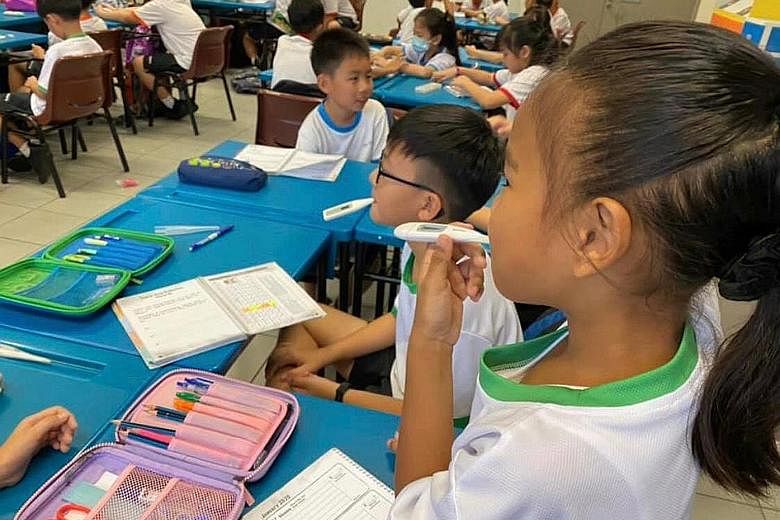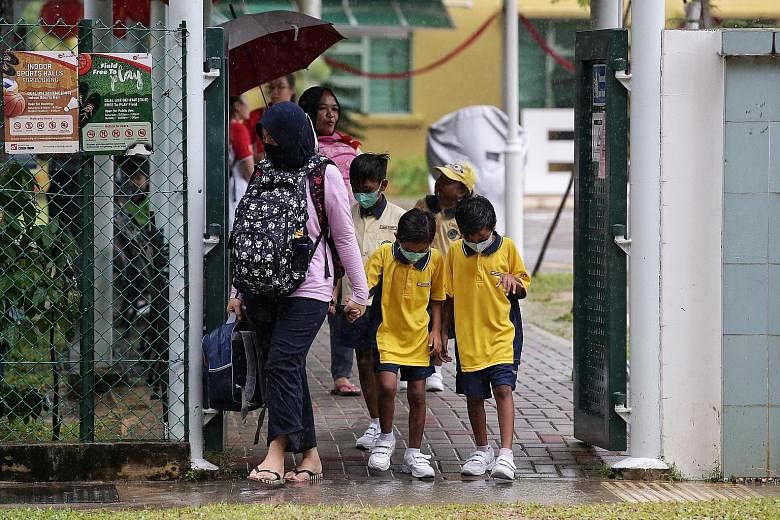Children across the island returned to school yesterday as the four-day Chinese New Year break drew to a close.
But before jumping back into lessons, all students had to measure - and report - their temperatures with personal thermometers. They were also monitored for flu-like symptoms.
Such measures came amid concerns about the Wuhan virus outbreak, with some feedback circulating online that the Ministry of Education (MOE) should have delayed the re-opening of schools for a week or two, as in Hong Kong.
In response, the ministry said it had sought advice from medical experts and considered a delay, but concluded that "it is not necessary to do so because there is currently no evidence of community spread of the virus in Singapore".
"Ours is a different situation compared to Hong Kong's. Hong Kong is closer to the epicentre of the Wuhan virus outbreak and is closely connected to China. The number of students and staff returning from China is likely to be many times ours," the ministry said in a frequently asked questions (FAQ) post on its website yesterday.
MOE assessed that the number of students and staff returning from China recently is manageable, and a 14-day leave of absence for those who had visited China over the past two weeks will "be more targeted, while allowing schools to open and life to carry on as normally as possible, which is an important aspect to safeguard in an emergency situation", MOE added.
The move is expected to affect some 800 students.
The leave of absence - a precautionary measure unlike a quarantine, which has legal force - does not apply to students and staff who had visitors from China but did not visit the country themselves.
MOE explained: "Like all precautionary measures, we have to decide how wide to cast the net. If we include those who have visitors from China, the same logic should apply to those whose friends or families have recently been to China. The net can grow exponentially wide."
The ministry also addressed concerns that designating university dorms as government quarantine facilities would put the wider student population at risk.
It said that the three university facilities - designated blocks at the National University of Singapore's Prince George's Park Residences, Nanyang Technological University's Graduate Hall 1 and Singapore Management University's Block 83 Prinsep Street - "have always been part of the Government's national contingency plan for a disease outbreak".
"The designated hostels will only be primarily activated when a student in our educational institutions or schools is required to serve a quarantine order and does not have suitable accommodation," said MOE.
Those who are served with quarantine orders must stay in their designated rooms at all times within the allocated period. They are not allowed to use common facilities within the quarantine facility. No visitors will be allowed, and food and all necessary supplies will be delivered to them.
Housewife Liew Cheng Huan, 53, who has three children in secondary school, said schools do not have to be closed for prolonged periods of time "as long as they follow the procedures recommended, with adequate manpower".
But there could be human error if students are tasked to take their own temperatures, she noted.
Her husband, a doctor who worked at the National University Hospital during the 2003 severe acute respiratory syndrome (Sars) outbreak, had contracted the Sars virus while on the job, she said.
"The fact that there are many overseas students from China is also a concern for me," Madam Liew added.













